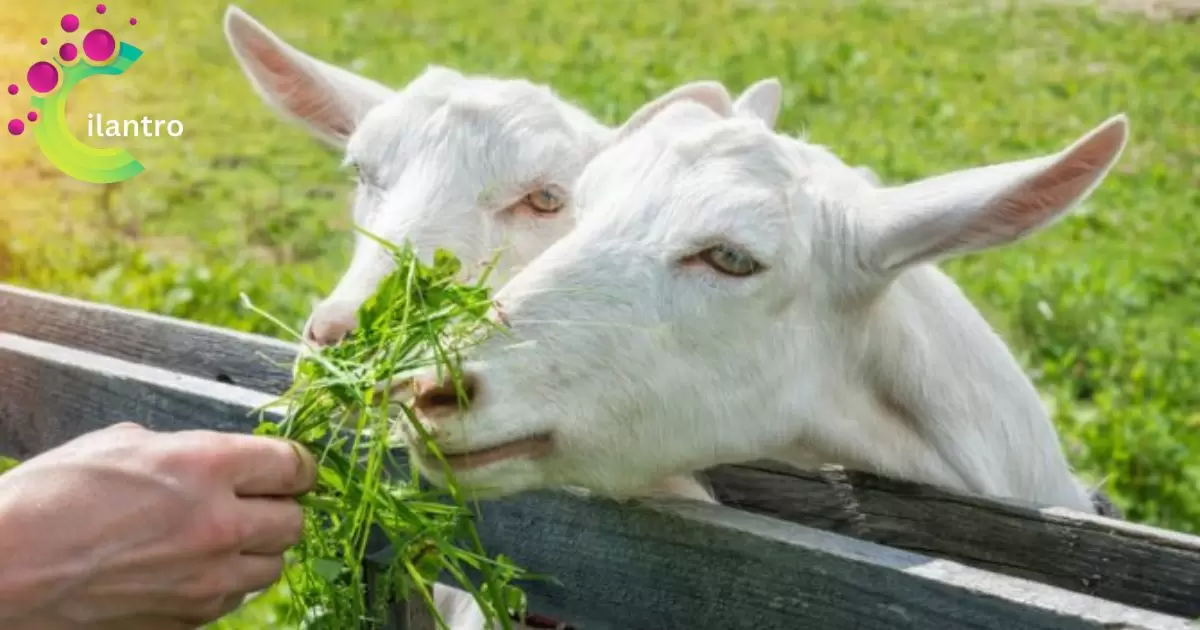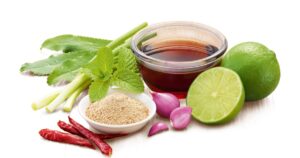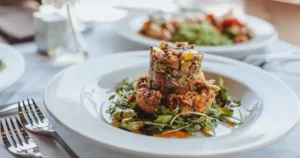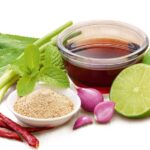Goats eat cilantro and are known for their diverse and sometimes unique dietary habits. As herbivores, their diet primarily consists of grasses, plants, and leaves.
With proper care and attention to goats’ nutritional needs, it can be a flavorful and healthy addition to their menu. When it comes to more specific items, the question arises regarding their suitability for goats. Can goats eat cilantro? Yes, they can eat cilantro. It is a safe and nutritious herb for them to consume in moderation. We will examine key facts and potential benefits of incorporating goats consumption of cilantro into their diet.
It’s safe for them and a nutritious treat. Cilantro is rich in vitamins and minerals that benefit goats. Introduce it slowly to their diet to avoid digestive issues. Fresh, clean cilantro is best for them. Avoid feeding wilted or spoiled cilantro. It’s a good idea to provide a varied diet for goats. Always monitor their reactions to new foods.
In this article, we discuss more interesting things about it, so stay tuned with us!
Understanding Goat Nutrition
Before we address the cilantro goat connection, it’s crucial to understand the nutritional needs of goats eat cilantro. Goats are ruminants, which means their stomachs have four compartments designed for efficient digestion of fibrous materials.
Their diet should be rich in fiber, with a balance of carbohydrates, proteins, vitamins, and minerals. With this foundation in mind, let’s explore how cilantro fits into the equation.
The Composition of Cilantro
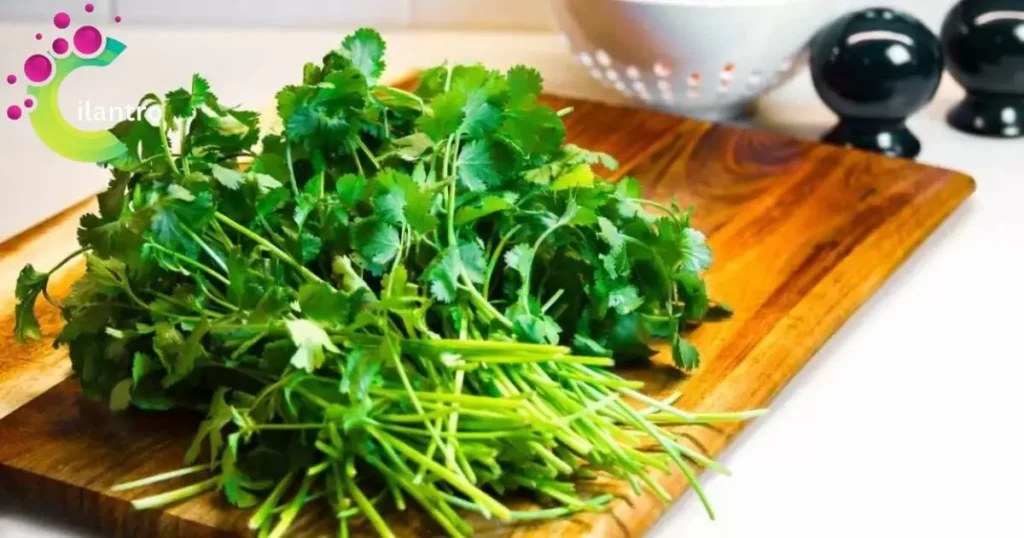
Cilantro, also known as coriander leaves, is a flavorful herb commonly used in various cuisines worldwide. It boasts a unique taste that some find refreshing, while others might describe it as slightly citrusy or peppery. Hamsters eat cilantro, and it is important to note that this herb is safe and can be included as a part of their diet, providing them with added nutritional benefits.
Goats eat cilantro. From a nutritional standpoint, cilantro is a rich source of vitamins A and K, as well as small amounts of other essential nutrients like calcium, potassium, and folate.
Can Goats Safely Consume Cilantro?
The short answer is yes. Goats who eat cilantro can safely eat it. In moderation, it can be a healthy addition to Goats Eat Cilantro’s diet. However, there are a few considerations to keep in mind:
Moderation is Key
While cilantro offers nutritional benefits, it should be fed in moderation. Goats eat cilantro, which requires a balanced diet, and it should not replace essential components such as high-quality forage and a suitable concentrate.
Avoid Toxic Varieties
Not all plants labeled as cilantro are created equal. Some varieties, especially those with additives or pesticides, can be harmful to goats. It’s crucial to ensure that the cilantro provided to goats eat cilantro is free from any toxic substances.
Introduce Gradually
When introducing any new food to goats diets, including cilantro, it’s essential to do so gradually. Sudden dietary changes can upset goats’ digestive systems, leading to issues such as bloating or diarrhea. Start with small amounts and observe how goats eat cilantro.
Benefits of Feeding Cilantro to Goats
Now that we’ve established the safety of feeding cilantro to goats, let’s explore the potential benefits:
Nutrient Boost
Cilantro contains vitamins and minerals that can complement goats’ nutritional needs. The presence of vitamins A and K is particularly beneficial for overall health, including immune function and bone strength.
Improved Palatability
Goats eat cilantro, and like humans, they have preferences when it comes to taste. Cilantro’s distinct flavor might make goats’ meals more enticing, encouraging them to consume a well rounded diet.
Natural Deworming Properties
Some studies suggest that cilantro may have natural deworming properties. While it should not replace regular deworming protocols, including cilantro in goat diets could contribute to a holistic approach to parasite control.
Can Goats eat Cilantro?
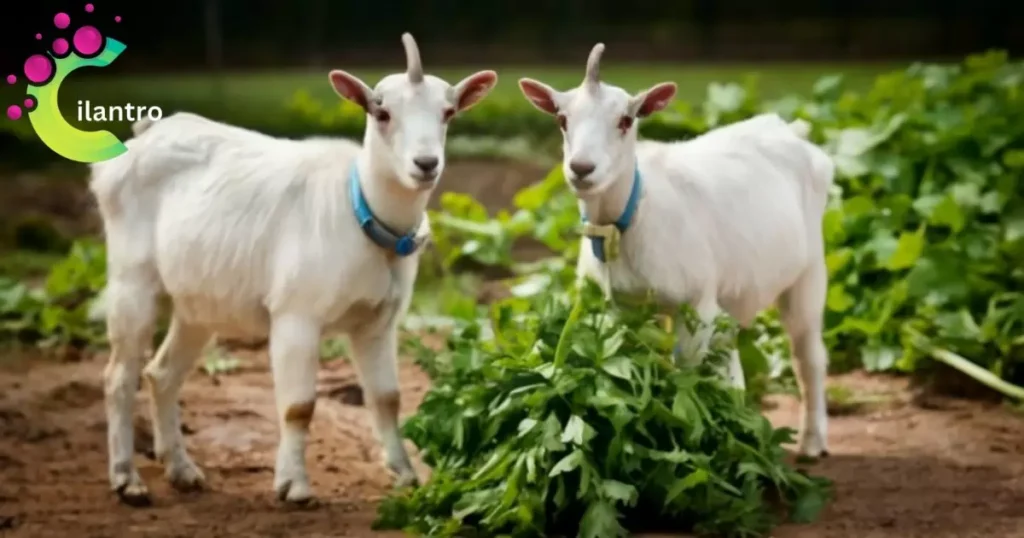
Goats can indeed consume cilantro as part of their diet. Cilantro is an herb with nutritional value, providing vitamins and minerals that contribute to overall goat health.
However, like any treat, it should be given in moderation to prevent overconsumption, as excessive intake may lead to digestive issues.
Preparing Cilantro for Goats
Preparing cilantro for goats is a simple task that ensures they get a tasty and nutritious treat. Start by washing the cilantro thoroughly to remove any dirt or pesticides. Goats eat cilantro, so chop the cilantro into small, manageable pieces, making it easier for them to enjoy this flavorful and healthy snack.
Ensure that the cilantro is fresh and free from any mold or spoilage. Feed the cilantro in moderation, as too much can upset a goat’s stomach. Observe the goats’ enjoyment as they nibble on this flavorful and healthy snack!
Can You Serve Cilantro with Cabbage for the Goats?
Yes, goats can eat cilantro. It’s a safe and nutritious herb for them. Cabbage is also suitable for goats. It provides additional nutrients and variety in their diet. Combining cilantro and cabbage makes a healthy treat for goats.
Cabbage and Goats
Goats can eat cabbage in moderation. Cabbage is a source of fiber and nutrients for goats. However, excessive amounts can lead to digestive issues, so it’s best to offer it in small portions.
Cilantro with Cabbage for Goats
Yes, you can serve cilantro with cabbage for goats. Mixing cilantro with cabbage creates a flavorful and nutritious combination. Ensure that the portions are balanced to prevent overfeeding and digestive problems.
Can You Serve Cilantro with Banana Peels for the Goats?
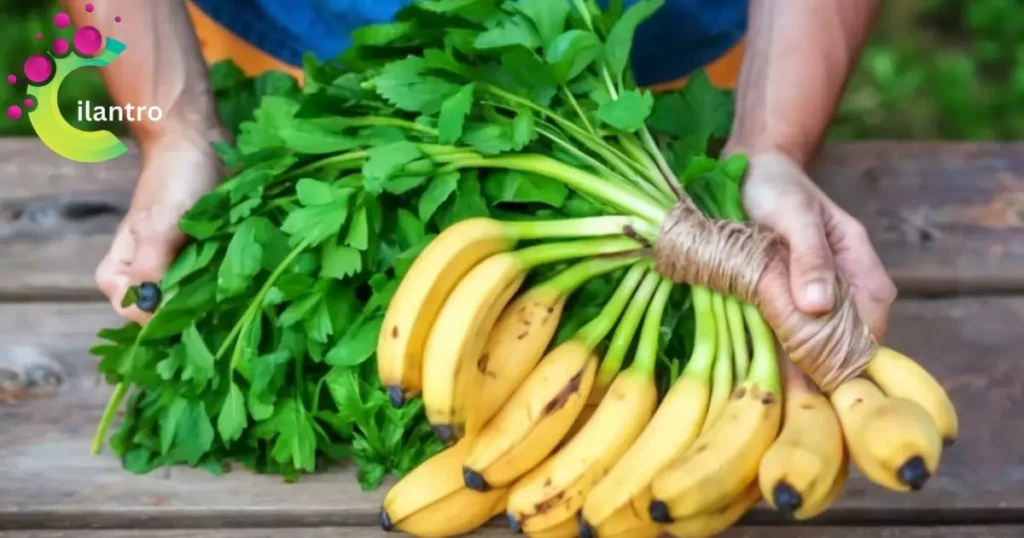
Goats love cilantro, and it’s a healthy treat for them. Goats eat cilantro along with banana peels, which are also safe for goats and provide extra nutrients.
You can serve cilantro and banana peels together as a tasty snack. Make sure to wash the cilantro thoroughly and remove any stickers from the banana peels before offering them to the goats.
Banana Peels and Goats
Goats can eat banana peels, but moderation is key. Banana peels are rich in nutrients and can be a tasty treat for goats. However, feeding them too many peels can cause digestive imbalances.
Cilantro with Banana Peels for Goats
Combining cilantro with banana peels is safe for goats, and goats eat cilantro. This mixture offers a blend of flavors and nutrients that goats may enjoy.
As always, introduce new foods gradually and observe the goats for any adverse reactions.
Things to Watch Out for When Feeding Cilantro to Your Goat
| # | Concern | Description |
| 1 | Toxic Plants | Ensure cilantro is free from toxic plants or contaminants that may harm goats. |
| 2 | Moderation | Feed cilantro in moderation, as excessive consumption may lead to digestive issues. |
| 3 | Introduce Gradually | Introduce cilantro gradually to the goat’s diet to monitor any adverse reactions. |
| 4 | Pesticide-Free | Use organic cilantro or ensure it is free from pesticides, as goats are sensitive to chemicals. |
| 5 | Allergies | Be aware of any allergies the goat may have to cilantro, and observe for allergic reactions. |
| 6 | Proper Washing | Wash cilantro thoroughly to remove dirt or contaminants before feeding it to the goats. |
| 7 | Balanced Diet | Cilantro should complement a balanced goat diet, not replace essential nutrients from other sources. |
| 8 | Monitoring Health | Regularly monitor the goat’s health, especially after introducing new foods like cilantro. |
| 9 | Avoid Rotting Cilantro | Do not feed cilantro that is spoiled or rotting, as it can cause health issues in goats. |
| 10 | Observe Behavior Changes | Keep an eye on the goat’s behavior, stool consistency, and overall well-being when introducing cilantro. |
What Parts of the Cilantro Plant Are Safe for Goats?
Goats can safely eat different parts of the cilantro plant. The leaves, stems, and seeds are all considered safe and nutritious for them. These parts provide essential vitamins and minerals that contribute to the overall health of the goats.
Leaves: Goats can safely consume cilantro leaves, which are rich in nutrients and provide a tasty treat for them.
Stems: The stems of the cilantro plant are safe for goats to eat, offering additional texture and variety in their diet.
Flowers: Cilantro flowers are edible for goats and can be a source of enrichment, adding a different flavor to their meals.
Seeds: While goats can eat cilantro seeds in moderation, it’s important not to overfeed them, as seeds are high in fat.
Avoiding Roots: Goats should not consume cilantro roots, as they may be difficult to digest and could potentially cause digestive issues.
Can Goats have Cilantro Juice?
They can have cilantro juice, but it’s important to exercise caution. While the juice can offer hydration and some nutrients, it should be given in small amounts.
Too much cilantro juice can lead to imbalances in their diet and potentially cause digestive upset.
Consideration for Individual Goats
It’s important to recognize that individual goats may have different preferences and tolerances when it comes to certain foods. Some goats may readily accept cilantro, while others may not be as interested.
Observing each goat’s response to new foods is vital to understanding their individual dietary needs.
Can Goats eat Cilantro Seeds?
Cilantro seeds are safe for goats in small quantities. Ensure that the seeds are clean and free from contaminants or mold. Introducing cilantro seeds can add variety to their diet, but moderation is key to avoiding any adverse effects.
Can Baby Goats eat Cilantro?
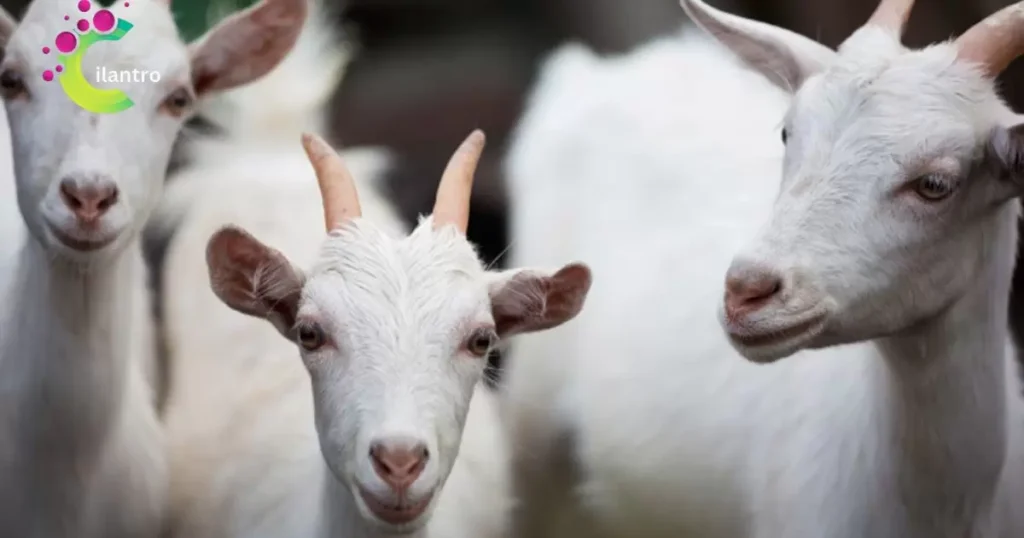
Young or baby goats can eat cilantro, but it’s crucial to introduce new foods gradually. Start with small amounts and observe their reactions. Baby goats may have more sensitive digestive systems, so monitoring for any signs of discomfort or allergies is essential.
What Other Herbs Can Goats Eat Apart From Cilantro?
Variety for goats: Goats enjoy a diverse diet beyond cilantro, with several herbs offering nutritional benefits.
Parsley Pleasures: Parsley is a great option, rich in vitamins and minerals, providing goats with a tasty and healthy alternative.
Minty Delights: Goats can relish mint, which not only adds flavor but also aids in digestion, promoting overall well-being.
Rosemary Riches: Rosemary, known for its aromatic properties, is another herb suitable for goats, adding a fragrant touch to their diet.
Thyme for Good Health: Thyme is a beneficial herb, offering antioxidants and supporting the immune system of goats.
Sage Choices: Incorporating sage into their diet can be advantageous, providing goats with additional nutrients for optimal health.
Can Goats have Cilantro Salad?
Goats can enjoy a cilantro salad as part of their diet, but it should be a diverse mix of goat-friendly vegetables. Incorporating a variety of vegetables ensures that goats receive a well-rounded nutritional intake.
Goats eat cilantro, and it can be a healthy addition to their diet. Avoid salads with harmful or toxic plants.
Why are my Goats not eating Cilantro?
- Goats may not like the taste of cilantro; they have individual preferences just like humans.
- Check if the cilantro is fresh; goats tend to avoid wilted or spoiled greens.
- Ensure there are no contaminants or pesticides on the cilantro, as goats can be sensitive to chemicals.
- Introduce cilantro gradually; sudden changes in diet can make goats hesitant to try new foods.
- Evaluate if there are other preferred food sources available; goats might be choosing alternatives over cilantro.
- Monitor your goats for signs of illness; a lack of appetite could be a symptom of underlying health issues.
Cautions with Cilantro for Goats
While cilantro is generally safe, precautions should be taken. Ensure the cilantro is free from pesticides or contaminants. Introduce new foods slowly, and closely monitor goats for any adverse reactions such as changes in behavior, appetite, or digestive issues.
Always consult with a veterinarian for specific dietary recommendations tailored to your goat’s needs.
Is Cilantro Bad for Goat’s Milk?
Cilantro is safe for goats to eat in moderation. Goats generally enjoy a varied diet, including herbs like cilantro. However, feeding excessive amounts may lead to digestive issues. Goat’s milk quality is not directly affected by cilantro consumption.
It’s essential to provide a balanced diet with proper nutrients. Always introduce new foods gradually to monitor any adverse reactions. Goats may benefit from the nutritional value of cilantro, but it should be part of a diverse and well-managed diet.
Can Goats Eat Cooked Cilantro?
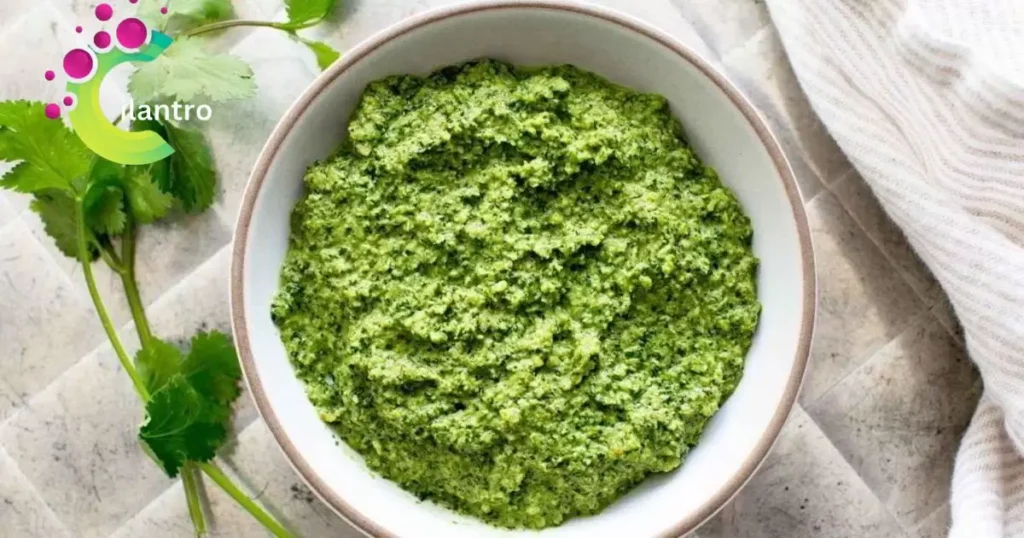
Goats should not eat cooked cilantro. Cooked food is not suitable for goats, as their digestive systems are designed for raw, natural foods. Cilantro itself is safe for goats to consume in moderation, but it should be fresh and not cooked.
Cooked food may lack essential nutrients that goats need. Feeding goats properly is crucial for their health and well-being. Stick to a balanced diet of fresh, uncooked vegetables and high-quality hay.
If you have concerns about your goat’s diet, consult with a veterinarian for guidance on proper nutrition. Remember, a healthy diet contributes to happy and thriving goats.
FAQ’s
Can goats eat spent grain?
Yes, goats can eat spent grain, but it should be done in moderation as a supplement to their regular diet.
What should goats not eat?
Goats should not eat toxic plants, like rhododendron and azalea, as well as certain human foods, such as onions and chocolate.
What is poisonous to a goat?
Rhododendron plants are poisonous to goats.
What is a goat’s worst enemy?
A goat’s worst enemy is often predators like wolves or coyotes.
Can chickens eat cilantro?
Yes, chickens can safely eat cilantro as part of their diet.
Conclusion
Understanding goat nutrition is pivotal for responsible goatkeeping, and incorporating cilantro into their diet can offer various health benefits when done judiciously. Can goats eat cilantro? Cilantro, rich in essential vitamins and minerals, provides a flavorful and nutritious addition to goats’ meals.
However, ensuring moderation, cautious introduction, and monitoring for potential adverse effects are paramount. The nutritional advantages, improved palatability, and potential natural deworming properties make cilantro a valuable supplement in a well-balanced goat diet.
Careful considerations such as avoiding toxic varieties, introducing cilantro gradually, and watching for behavioral changes contribute to maintaining the goats’ overall well-being. Combining cilantro with other safe foods like cabbage or banana peels adds variety to their diet.
Ultimately, responsible feeding practices, individualized attention to preferences, and regular monitoring of goat health are essential for fostering a healthy and thriving goat population. Always seek professional veterinary advice for tailored dietary recommendations, ensuring a harmonious blend of nutrition and care for these resilient and delightful animals.

Meet our website’s admin, a culinary enthusiast dedicated to curating delectable food ideas. With a passion for gastronomy, they expertly craft and present a diverse array of recipes, tips, and inspirations, making our platform a go-to destination for culinary creativity.
